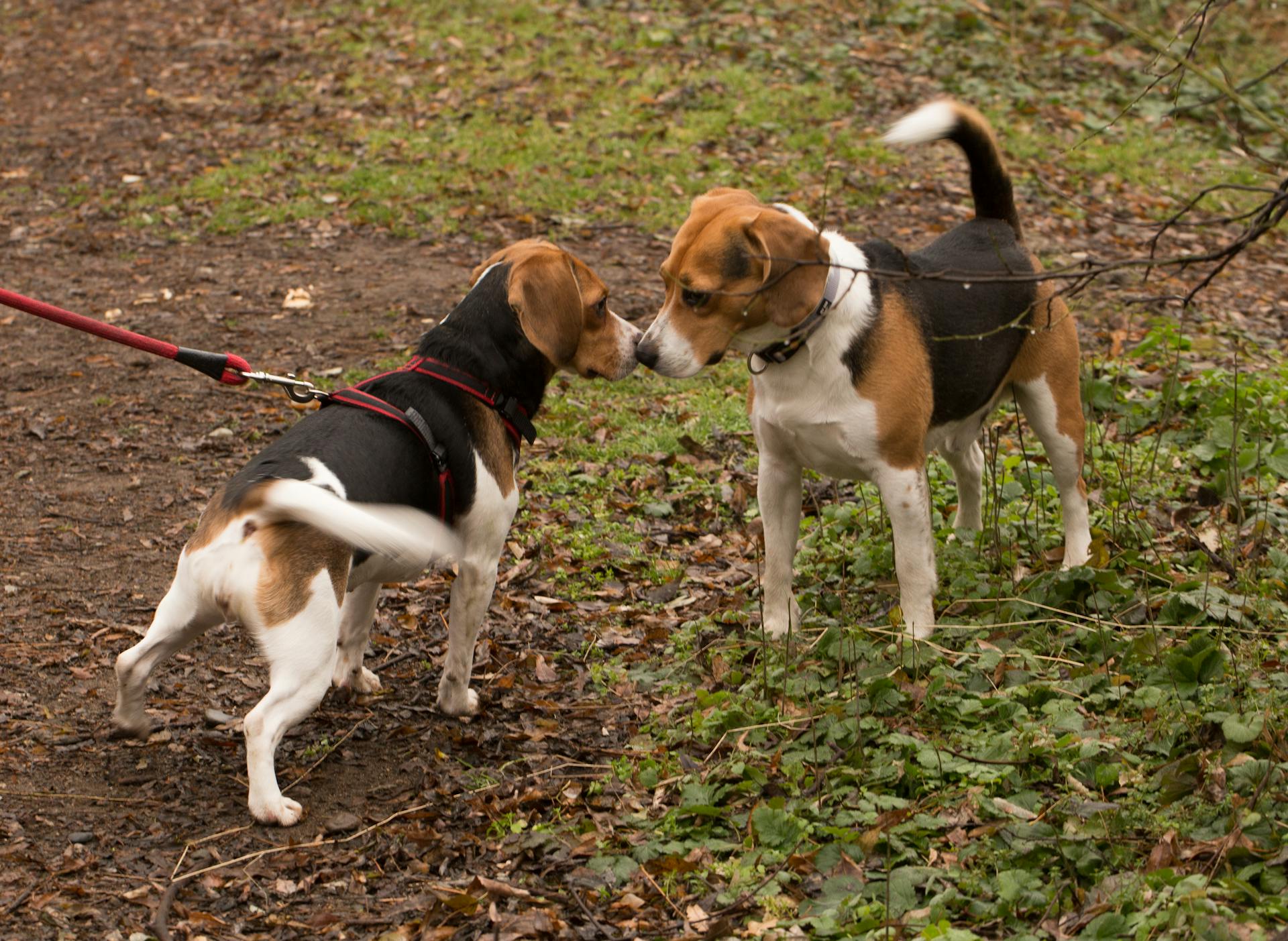
Welcoming a new Beagle puppy into your family can be an incredibly exciting experience.
Beagles are small to medium-sized dogs that typically weigh between 18 and 30 pounds.
Their short coats require minimal grooming, making them a great choice for busy owners.
Puppies need their vaccinations at 6-8 weeks of age, with the core vaccinations being Rabies and Distemper.
Characteristics and Traits
Beagle puppies are sturdy little hunting dogs, often resembling miniature Foxhounds.
Their compact size makes them a popular choice among dog owners, and according to the American Kennel Club (AKC), Beagles are among the most popular dog breeds in the United States.
You can expect your beagle puppy to come in one of two sizes: 13-inch tall or 15-inch tall. Their coat colors can include any true hound color, tricolor, red, lemon, and white.
Their distinctive features include large, expressive eyes that are usually brown or hazel, wide, long ears, a black nose, and a tail set high but not curled over the back.
Here are the different sizes of beagle puppies:
- 13-inch tall Beagle
- 15-inch tall Beagle
Their coat colors can include:
- Any true hound color
- Tricolor
- Red
- Lemon
- White
Origins and History
The origins of Beagle puppies are quite fascinating! Some records point to the 1500s, although documentation is scarce.
Beagles have a long history that dates back before the Romans arrived in England. It's believed that sight and scent hounds descended from early dogs present in the region at that time.
Fox hunting became popular in 18th-century England, which led to the creation of the Foxhound by crossing a buck hound and a Beagle. This is where the modern Beagle breed started to take shape.
The first National Beagle Club of America was formed in 1887, followed closely by the establishment of the English Beagle Club. These clubs played a significant role in developing the breed standard.
Here's a brief timeline of some key events:
* 1800s: Fox hunting becomes popular in England.1870s: Hunting hounds are referred to as Beagles in the southern states of America.1885: The Beagle breed is officially added to the AKC.1887: The National Beagle Club of America is formed.
These clubs helped standardize the breed, and it wasn't long before well-bred Beagles from England were sent to the United States to be crossed with southern hounds. This cross led to the development of two height classes for the breed in the U.S.
Today, Beagle puppies are not only used for hunting but also make wonderful companion pets. They participate in various activities like conformation, tracking, obedience, agility, and even therapy dog work!
Recommended read: Beagle Dogs
Personality and Temperament
Beagle puppies are known for being sweet, loving, and gentle companions. They possess a natural curiosity and high intelligence, making them great friends to have around.
One thing to keep in mind is that Beagles were originally bred to be part of a pack, so they need companionship whether it's from humans or other dogs. This means they'll thrive in homes where there are multiple pets or people to interact with.
Beagle puppies are excellent with children and other dogs, but their strong hunting instincts may require thorough socialization from a young age to get along with non-canine pets. This is especially important if you have other pets at home that you want your Beagle puppy to be friends with.
To ensure your Beagle puppy grows into a well-mannered and confident adult, it's essential to socialize them from an early age. Your vet can provide recommendations on how to safely and appropriately expose your puppy to new things.
For more insights, see: Beagle Laboratory Rescue
Here are some key traits to keep in mind when raising a Beagle puppy:
- Beagles need firm, consistent training to curb unwanted behaviors such as guarding, obsessive barking, snapping, biting, and destructive actions.
- They're prone to separation anxiety, so it's crucial to minimize the time they're left alone or keep them occupied while you're away.
Overall, Beagle puppies are loving, affectionate pets that thrive in well-structured environments where they can fully express their friendly nature. With patience, socialization, and proper training, your Beagle puppy will grow into a loyal companion that brings joy to your life.
Consider reading: Beagle and Basset Hound Mix Puppies
Care and Upkeep
Beagles need at least one hour of exercise every day, if not more, to stay happy and healthy.
Regular ear cleaning is a must for Beagles due to their floppy ears making them susceptible to ear infections.
To keep your Beagle's weight in check, it's essential to feed them measured meals spaced at regular time intervals.
Caring For
Caring For Your Beagle is a big responsibility, but with the right knowledge, you'll be well on your way to raising a happy and healthy pup.
First and foremost, Beagles need plenty of activities and supervision to prevent them from getting into trouble. They're prone to following their nose, so make sure to keep an eye on them at all times.

In addition to mental stimulation, Beagles also require special attention to their physical health. Their floppy ears make them more susceptible to ear infections, so regular cleaning is a must.
Beagles are also prone to obesity, so it's essential to feed them measured meals spaced at regular time intervals. Free-feeding is not recommended, as it can lead to overeating and weight gain.
Here are some key grooming tips for your Beagle:
- Brush your Beagle weekly with a bristle brush.
- Bathe your Beagle when necessary, but not too often.
- Check the ears regularly for drainage and infection.
- Inspect your Beagle for ticks, cuts, and debris if they work or hunt outdoors.
- Check and clean their teeth daily, and keep their nails at an acceptable length.
By following these simple tips, you can help ensure your Beagle stays happy and healthy.
Grooming Guide
Grooming is a straightforward part of Beagle care. They have short coats that don't require much grooming.
Regular brushing can help with shedding, which means less fur on your floor. Weekly brushing is recommended to keep loose hair under control.
Beagles are moderate shedders, so you'll need to brush them weekly to prevent loose hair from getting everywhere. You should also bathe them every two to four weeks, depending on their activity level.
For Beagle puppies, grooming needs are relatively low due to average shedding. Regular care helps maintain their coat and overall health.
Here's a quick rundown of key grooming tips for Beagles:
- Brush weekly with a bristle brush.
- Bathe when necessary, but not too often.
- Check the ears regularly for drainage and infection.
- Inspect them for ticks, cuts, and debris if they work or hunt outdoors.
- Check and clean their teeth daily, and keep their nails at an acceptable length.
Grooming is simple compared to keeping your Beagle exercised and mentally stimulated.
Ear Care
Ear Care is a crucial part of your Beagle's overall health and well-being.
Their floppy ears make them more susceptible to ear infections, so regular cleaning is essential. To prevent this, clean their ears once or twice a month using a veterinarian-recommended ear cleaner.
Beagles can get ear infections if not properly cared for, so it's vital to schedule a vet exam if you notice any signs of an infection in your dog's ears.
Health and Wellness
As a Beagle owner, you want your furry friend to live a long and healthy life. The average Beagle lifespan is 10-15 years.
Annual veterinary appointments are crucial to catch any potential health issues early on. This includes checking for heart disease, eye problems, back problems, and other common concerns in Beagles.
Here are some specific health issues you should be aware of:
- Epilepsy
- Heart disease
- Eye problems
- Back problems
- Chondrodysplasia (cartilage and bone problems most often affecting the legs/feet)
Remember, prevention is key! Regular check-ups can help identify any potential health issues before they become serious problems.
Health Issues

As a Beagle owner, it's essential to be aware of the potential health problems that can affect your furry friend.
Beagles are prone to epilepsy, which is a neurological condition that causes seizures. Always keep an eye out for signs like trembling, drooling, or losing consciousness.
Heart disease and eye problems are also common in Beagles. Regular veterinary check-ups can help identify these issues early on.
Back problems and chondrodysplasia (cartilage and bone problems) are other health concerns that can affect your Beagle's legs and feet. Keep an ear out for any unusual sounds or signs of discomfort.
Mast cell tumors are a type of cancer that can occur in Beagles. If you notice any unusual lumps or growths, consult with your veterinarian right away.
Here are some specific health concerns to be aware of:
- Intervertebral disk disease
- CHD (Congenital Heart Disease)
- Glaucoma
- Epilepsy
- CPRA (Cryptorchidism, Patellar Luxation, and Retinal Dysplasia)
- Hypothyroidism
- Patellar luxation
- Chondrodysplasia
- Cherry eye
- Distichiasis
- KCS (Keratoconjunctivitis Sicca)
Remember, regular veterinary check-ups and monitoring your Beagle's behavior can help identify these health issues early on.
Dental Care
Taking care of your dog's dental health is just as important as their overall well-being. Brushing your dog's teeth at home every day is the best way to prevent dental disease.
Regular brushing with a dog-safe toothpaste and toothbrush can make all the difference. Use a gentle touch and be sure to get those hard-to-reach areas.
Professional cleanings at your vet's recommendation are also essential for maintaining good oral health in dogs.
Limber Tail Syndrome
Limber Tail Syndrome is a temporary condition that can affect your dog, especially if they have a long tail like Beagles.
This syndrome results from excessive wagging, which strains the muscles used to keep the tail upright.
The strain causes a limp and sore tail, making it uncomfortable for your dog.
A fresh viewpoint: Puppy Fading Syndrome Signs
Allergies
Allergies can be a common issue for Beagles.
About 50% of ear infections in Beagles are caused by allergies.
Beagles may start to scratch excessively due to environmental and food allergies.
Medicated shampoos, mousses, wipes, and sprays can be helpful for itchy skin and allergies in Beagles.
Oral medications like Apoquel or Cytopoint prescribed by your vet can also benefit from treating environmental/seasonal allergies.
Ear Infections
Ear Infections are a common issue for Beagles, and it's essential to know how to identify them and prevent them.
Beagles are prone to ear infections due to their floppy ears, which can trap dirt and moisture, creating an ideal environment for bacteria and yeast to grow. Regular ear cleaning is crucial to prevent these infections.
Cleaning your Beagle's ears once or twice a month with a veterinarian-recommended ear cleaner can go a long way in preventing ear infections. If you notice any signs of an infection, such as redness, swelling, or discharge, schedule a vet exam right away.
About 50% of ear infections in Beagles are caused by allergies, so it's essential to keep an eye out for excessive scratching and consult with your veterinarian if you suspect allergies might be the culprit.
What is the Limit?
A Beagle can have an average litter size of about 7 puppies.
Some animals can live for a surprisingly long time - a tortoise's lifespan can reach up to 150 years.
A typical human pregnancy lasts around 280 days, or approximately 9 months.
The maximum speed of a cheetah is around 70 miles per hour.
Frequently Asked Questions
How much should a Beagle puppy cost?
Beagle puppy prices range from $500 to $2,000 in the US, depending on factors like breeder reputation and pedigree. Adoption options are also available through animal rescues
Featured Images: pexels.com


